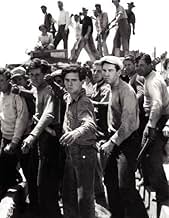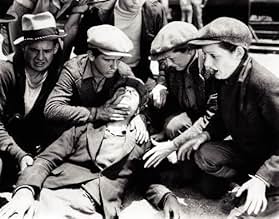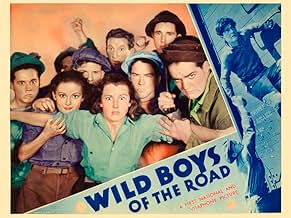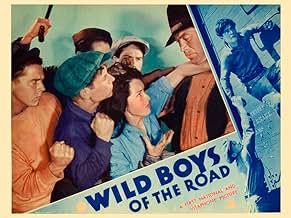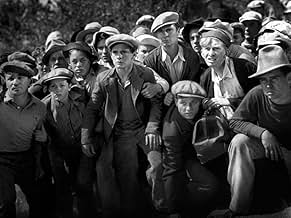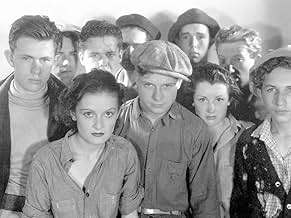Ajouter une intrigue dans votre langueIn the depths of the Depression, two teenage boys strike out on their own in order to help their struggling parents and find life on the road tougher than expected.In the depths of the Depression, two teenage boys strike out on their own in order to help their struggling parents and find life on the road tougher than expected.In the depths of the Depression, two teenage boys strike out on their own in order to help their struggling parents and find life on the road tougher than expected.
- Prix
- 1 victoire au total
- Sally
- (as Dorothy Coonan)
- Boy
- (uncredited)
- Police Sergeant
- (uncredited)
- Policeman in Court
- (uncredited)
- Brakeman Throwing Stones
- (uncredited)
- Youth in Line-up
- (uncredited)
Histoire
Le saviez-vous
- AnecdotesThe movie shown in the movie theater scene (about an hour into the film) is another Warner Bros. release, Prologue (1933).
- GaffesSally's piece of cake jumps from the plate into her hands between shots.
- Citations
Eddie: [to the judge] I knew all that stuff about you helping us was baloney. I'll tell you why we can't go home: because our folks are poor. They can't get jobs and there isn't enough to eat. What good will it do you to send us home to starve? You say you've got to send us to jail to keep us off the streets. Well, that's a lie. You're sending us to jail because you don't want to see us. You want to forget us. But you can't do it because I'm not the only one. There's thousands just like me, and there's more hitting the road every day.
Tommy: [also to the judge] You read in the papers about giving people help. The banks get it. The soldiers get it. The breweries get it. And they're always yelling about giving it to the farmers. What about us? We're kids!
- ConnexionsFeatured in Alibi Mark (1937)
- Bandes originalesThe Gold Diggers' Song (We're in the Money)
(uncredited)
Music by Harry Warren
[Played after the kids leave the dance; also whistled by Eddie (Frankie Darro)]
The movie wouldn't work so well without the contrast the first half-hour provides. Darro and friends are typical middle-class teens, fun-loving and care-free. It's a world of proms, necking parties, and harmless pranks. Then without warning things change. Why they change is never really explained which is the way it should be. For most kids knew nothing of stock markets and dis-investment. They only knew that suddenly Dad doesn't go to work anymore and mom cries a lot, bills pile up, and no one gets a job, anywhere. Middle-class privilege plunges into no-income poverty, and Darro and his buddy do like millions of others. They hop a freight, hoping the next town, the next state, the next someplace, will give them a chance to make a living. What they get instead are private armies, battalions of cops, and a forest of billy clubs. They're driven on to the next jurisdiction and the next welcoming committee. Nobody wants the footloose unemployed adding to their own local problems. Maybe the attitude's not charitable, but it makes practical sense.
The battles atop freight cars and in hobo jungles are expertly filmed and dynamically staged, a stark panorama of social desperation. These scenes make up the movie's centerpiece. If anything they're mildly presented compared to the actual blood-letting that surrounded the desperate and up-rooted. Union organizing was especially bloody and bitterly fought-- an explosive topic Hollywood has only timidly touched on over the years. Nonetheless, the nail-biting episode on the train track stands-in for at least some of the actual pain and suffering caused by those crisis years.
Darro may be small, but he's energetic, something of a younger Cagney. His determined spirit to keep going no matter what is convincing, and helps drive the others on. I expect it also had that effect on audiences of the day. I like the way director Wellman suggests the kids can set up their own constructive community, if given half-a-chance. Some reviewers complain about the final scene with the understanding judge. Yes, it is pretty contrived, but it wasn't unrealistic given the package of New Deal reforms then in the works. If those measures didn't exactly solve the economic crisis (only WWII did that), they at least offered hope that the problems would no longer be kicked down the road to the next jurisdiction.
Wild Boys may not be the most honest or best movie on those tumultuous years. Still, it does furnish a provocative and entertaining glimpse. In any event, some books should not remain closed. After all, who knows when the unfortunate history of that era may again repeat itself.
- dougdoepke
- 18 sept. 2007
- Lien permanent
Meilleurs choix
- How long is Wild Boys of the Road?Propulsé par Alexa
Détails
- Date de sortie
- Pays d’origine
- Langue
- Aussi connu sous le nom de
- Wild Boys of the Road
- Lieux de tournage
- Southern Pacific Taylor Yard, Glendale, Californie, États-Unis(train yard sequence)
- société de production
- Consultez plus de crédits d'entreprise sur IMDbPro
- Durée1 heure 8 minutes
- Couleur
- Mixage
- Rapport de forme
- 1.37 : 1
Contribuer à cette page



